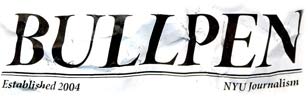Backgrounder: Dan Grossman
RELATED:
Listening to Dan Grossman’s radio documentaries is like seeing a one-man show on Broadway. His broadcasts vibrate at some of the most popular frequencies around the country, but wander behind the scenes and you will find only him — the freelance producer, writer, and reporter for all of his broadcasts.
“My job is…different from what a lot of other journalists do,” Grossman said in a phone interview with BULLPEN. Because he uses only sound, he can present his stories more theatrically than a print journalist can, and without organizing the team of production assistants necessary to produce television news stories. One-man reporting requires that Grossman operate his own equipment, but it allows him to explore remote places that journalists who are constrained by weekly columns or radio shows don't have time to get to.
As a freelancer, Grossman does all of his own research, buys his own equipment, teaches himself how to use it, and produces his own shows for networks abroad, including the Australian Broadcasting Corporation, Radio Netherlands, and Germany’s Deutsche Welle, and shows at home, including National Public Radio's Weekend Sunday Edition and Living on Earth.
Before he started producing radio, Grossman worked as a freelance print journalist, and he still contributes frequently to Audubon, Scientific American, Discover, and The Boston Globe. In more than two decades of reporting, Grossman has only worked full-time once, at NPR's Living on Earth. Almost immediately, he decided that the creative control afforded by independent reporting was more rewarding than a full-time gig, under an editor’s watchful eye.
“That makes it a lot of fun,” said Grossman, who described freelance reporting as “very challenging” yet “sometimes frustrating.” He added: “It doesn’t pay very well, but there are other benefits that I’ve decided outweigh the down-side.” Freelancing allows Grossman to choose the stories he will pursue. Typically, his curiosity leads him to places where scientists are studying the evidence of climate change. Last May, when he took an interest in the effect of global warming on the world’s ice deposits, Grossman toted his recording equipment from his home in Boston to the coldest regions of the planet. “I wanted to go where the ice was,” he said. But there are no tourist package-trips to the places Grossman chooses to go; in this case, for example, he had to hitch a ride on a Norwegian research vessel headed for Svalbard, a frozen archipelago in the Arctic Ocean. For the same project about sea ice, Grossman followed a glaciologist to the Andes and traveled with scientists to Antarctica.
Although National Geographic eventually bought the piece he did on sea ice and plans to air it as a documentary, Grossman says he had no sponsors lined up when he set off for Svalbard. Free from editorial control, Grossman planned out a “menu” of what he wanted to do, based on his interests alone.
“I enjoy controlling the conditions under which I work,” Grossman said. “I get to decide when I work and when I don’t work. I get to control my deadlines.” As a result, he can take the time necessary to examine every angle of any given story.
Grossman admits that there is a price to pay for his independence, but he is confident that freelancing works best for him. “Of course there are significant tradeoffs,” he says. “In an institution, I would have work comrades. I would have all sorts of support, such as technical support for the computer, human resources. I’m sure some freelancers are able to make as much money as people doing the same work as a staff member somewhere. In my case I don’t. Nonetheless, on balance, I like the choice I’ve made.”
Sources
“Dan Grossman.” WBUR.org: Antarctica. http://www.wbur.org/special/antarctica/journal/bio.asp
Grossman, Daniel. “Aboriginal Climate Change.” NPR: Weekend Edition Sunday. 17 March 2002. http://www.npr.org/templates/story/story.php?storyId=1140067
Grossman, Daniel. Personal phone interview. 11 April 2007.
“Daniel Grossman.” The Environment Report: GLRC Staff and Producers. http://www.glrc.org/about/glrc_staff_bio.php3?id=111
Cohenour, Tom. “Around the Continent: Palmer Station.” The Antarctic Sun. 12 January 2003. http://antarcticsun.usap.gov/oldissues2002-2003/Sun011203/continent.html
“Daniel Grossman.” AAAS.org: AAAS Journalism Awards — 2003 recipients. http://www.aaas.org/aboutaaas/awards/sja/2003/win-grossman.shtml

